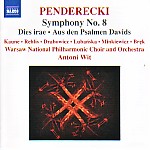Penderecki deserves a great deal of credit for turning his back on the avant-garde of the 1960s and ’70s, recognizing much of it for the musical dead-end that it has turned out to be. His “return to Romanticism” was prophetic, but at the same time we must remember that there really are only two kinds of music: good and bad, and the fact that some music might be more conventionally listenable doesn’t make it inherently better. On the whole, Penderecki always has been a very talented composer, deeply concerned with serious expressive issues, but this hasn’t prevented some of his neo-Romantic works from sounding relentlessly heavy, grey, and dull, nor does his change of style diminish the sonic thrill of his earlier, more radical pieces. He did excellent work in all periods, as you can plainly hear on this marvelous new release.
The Eighth Symphony, “Songs of Evanescence”, actually is a cycle of 12 German poems by the likes of Rilke, Goethe, Eichendorf, and Hesse. Far from being uniformly grim, the texts (available on Naxos’ website) speak of the cycle of life, death, and renewal in a manner not too dissimilar from Mahler’s Das Lied von der Erde (save that the entire work lasts scarcely longer than Mahler’s last song, “The Farewell”). The music is beautiful: lyrically melodic, sumptuously scored, and highly varied, with harmony that ranges from the sweetly diatonic to ferociously dissonant, everywhere responsive to the text. This piece, which requires solo soprano, mezzo, baritone, and full chorus, must rank among Penderecki’s finest recent creations, and I easily could see it becoming a repertory item.
Dies Irae, dating from 1967, is a work of Penderecki’s radical phase. As the title suggests, it’s a dark, menacing, but sonically enthralling piece that forces both vocal and orchestral forces to make some of the most hair-raising sounds in Western music. It’s interesting how with the passage of time much of the music’s perceived difficulty has evaporated, leaving behind a raw-nerved, expressionistic intensity that’s quite special and all the more moving for being very much of its time and place (aren’t all classics?). The brief Psalms of David, from the late 1950s, helped to establish Penderecki’s credentials as a major composer. The percussive last movement might strike today’s listeners as almost Latin-sounding, though of course the harmonic language is more acerbic, but the music exudes the freshness of a powerful new voice on its first flights of fancy.
Antoni Wit’s Naxos recordings, particularly those of contemporary music, have been almost uniformly splendid, and this one is no exception. He summons terrific playing from the orchestra, has a brilliant and enthusiastic choir at his disposal, and has assembled a very impressive team of soloists, especially soprano Michaela Kaune, baritone Wojtek Drabowicz, and tenor Richard Minkiewicz. Singing this stuff isn’t easy, but they make it seem so. The sonics capture the music’s massive climaxes as well as its more ethereal moments in natural balance, and with plenty of head room. In short, this disc makes an ideal introduction to Penderecki’s art, and to his vocal music in particular. It covers his entire creative life thus far, and offers compelling evidence of just how fine a composer he was, and remains.
































